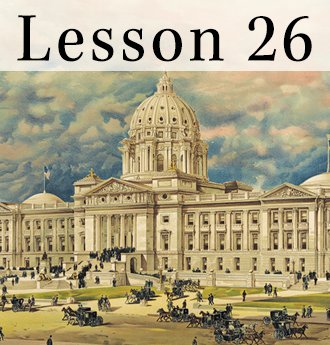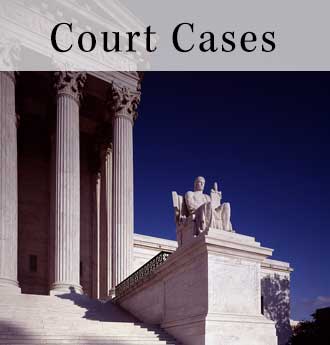Lesson 26: How Does American Federalism Work?
The case summaries below were provided by Oyez and licensed under the Creative Commons Attribution-NonCommercial 4.0 International License. Please visit Oyez.org for more case summaries.
Cooper v. Aaron (1958)
Facts of the case:
The governor and the legislature of Arkansas openly resisted the Supreme Court's decision in Brown v. Board of Education. They refused to obey court orders designed to implement school desegregation. Local officials delayed plans to do away with segregated public facilities.
Case Question:
Were Arkansas officials bound by federal court orders mandating desegregation?
Case Conclusion:
In a signed, unanimous per curiam opinion, the Court held that the Arkansas officials were bound by federal court orders that rested on the Supreme Court's decision in Brown v. Board of Education. The Court noted that its interpretation of the Fourteenth Amendment in Brown was the supreme law of the land and that it had a "binding effect" on the states. The Court reaffirmed its commitment to desegregation and reiterated that legislatures are not at liberty to annul judgments of the Court.
Citation:
The Oyez Project, Cooper v. Aaron, 358 U.S. 1 (1958)
Link to case: http://oyez.org/cases/1950-1959/1958/1958_1
Plyler v. Doe (1982)
Facts of the case:
A revision to the Texas education laws in 1975 allowed the state to withhold from local school districts state funds for educating children of illegal aliens. This case was decided together with Texas v. Certain Named and Unnamed Alien Child.
Case Question:
Did the law violate the equal protection clause of the Fourteenth Amendment?
Case Conclusion:
Yes. The Court reasoned that illegal aliens and their children, though not citizens of the United States or Texas, are people "in any ordinary sense of the term" and, therefore, are afforded Fourteenth Amendment protections. Since the state law severely disadvantaged the children of illegal aliens, by denying them the right to an education, and because Texas could not prove that the regulation was needed to serve a "compelling state interest," the Court struck down the law.
Citation:
The Oyez Project, Plyler v. Doe, 457 U.S. 202 (1982)
Link to case: http://oyez.org/cases/1980-1989/1981/1981_80_1538
Cruzan v. Missouri Department of Health (1990)
Facts of the case:
In 1983, Nancy Beth Cruzan was involved in an automobile accident which left her in a "persistent vegetative state." She was sustained for several weeks by artificial feedings through an implanted gastronomy tube. When Cruzan's parents attempted to terminate the life-support system, state hospital officials refused to do so without court approval. The Missouri supreme court ruled in favor of the state's policy over Cruzan's right to refuse treatment.
Case Question:
Did the due process clause of the Fourteenth Amendment permit Cruzan's parents to refuse life-sustaining treatment on their vegitated daughter's behalf?
Case Conclusion:
No. In a 5-to-4 decision, the Court held that while individuals enjoyed the right to refuse medical treatment under the Due Process Clause, incompetent persons were not able to exercise such rights. Absent "clear and convincing" evidence that Cruzan desired treatment to be withdrawn, the Court found the State of Missouri's actions designed to preserve human life to be constitutional. Because there was no guarantee family members would always act in the best interests of incompetent patients, and because erroneous decisions to withdraw treatment were irreversible, the Court upheld the state's heightened evidentiary requirements.
Citation:
The Oyez Project, Cruzan v. Director, Missouri Dept. of Health, 497 U.S. 261 (1990)
Link to case: http://oyez.org/cases/1980-1989/1989/1989_88_1503
Washington v. Glucksberg (1997)
Facts of the case:
Dr. Harold Glucksberg--along with four other physicians, three terminally ill patients who have since died, and a nonprofit organization that counsels individuals contemplating physician assisted-suicide--brought this suit challenging the state of Washington's ban on physician assisted-suicide. The state of Washington has historically criminalized the promotion of suicide attempts by those who "knowingly cause or aid another person to attempt suicide." Glucksberg alleged that Washington's ban was unconstitutional. Following a district court ruling favoring Glucksberg and his fellow petitioners, the Ninth Circuit affirmed the decision and the Supreme Court agreed to hear Washington's case.
Case Question:
Did Washington's ban on physician assisted-suicide violate the Fourteenth Amendment's due process clause by denying competent terminally ill adults the liberty to choose death over life?
Case Conclusion:
No. Analyzing the guarantees of the Due Process Clause, the Court focused on two primary aspects: the protection of our nation's objective fundamental, historically rooted, rights and liberties; and the cautious definition of what constitutes a due process liberty interest. The Court held that the right to assisted suicide is not a fundamental liberty interest protected by the Due Process Clause since its practice has been, and continues to be, offensive to our national traditions and practices. Moreover, employing a rationality test, the Court held that Washington's ban was rationally related to the state's legitimate interest in protecting medical ethics, shielding disabled and terminally ill people from prejudice which might encourage them to end their lives, and, above all, the preservation of human life.
Citation:
The Oyez Project, Washington v. Glucksberg, 521 U.S. 702 (1997)
Link to case: https://www.oyez.org/cases/1996/96-110
Printz v. United States (1997)
Facts of the case:
The Brady Handgun Violence Prevention Act (Brady Bill) required "local chief law enforcement officers" (CLEOs) to perform background checks on prospective handgun purchasers, until such time as the Attorney General establishes a federal system for this purpose. County sheriffs Jay Printz and Richard Mack, separately challenged the constitutionality of this interim provision of the Brady Bill on behalf of CLEOs in Montana and Arizona, respectively. In both cases district courts found the background checks unconstitutional, but ruled that since this requirement was severable from the rest of the Brady Bill a voluntary background check system could remain. On appeal from the Ninth Circuit's ruling that the interim background check provisions were constitutional, the Supreme Court consolidated and heard the cases, deciding this one along with Mack v. United States.
Case Question:
Using the necessary and proper clause of Article I as justification, can Congress temporarily require state CLEOs to regulate handgun purchases by performing those duties called for by the Brady Bill's handgun applicant background checks?
Case Conclusion:
No. The Court constructed its opinion on the old principle that state legislatures are not subject to federal direction. The Court explained that while Congress may require the federal government to regulate commerce directly, in this case by performing background checks on applicants for handgun ownership, the Necessary and Proper Clause does not empower it to compel state CLEOs to fulfill its federal tasks for it--even temporarily. The Court added that the Brady Bill could not require CLEOs to perform the related tasks of disposing of handgun-application forms or notifying certain applicants of the reasons for their refusal in writing, since the Brady Bill reserved such duties only for those CLEO's who voluntarily accepted them.
Citation:
The Oyez Project, Printz v. United States, 521 U.S. 898 (1997)
Link to case: http://oyez.org/cases/1990-1999/1996/1996_95_1478
Gonzales v. Raich (2005)
Facts of the case:
In 1996 California voters passed the Compassionate Use Act, legalizing marijuana for medical use. California's law conflicted with the federal Controlled Substances Act (CSA), which banned possession of marijuana. After the Drug Enforcement Administration (DEA) seized doctor-prescribed marijuana from a patient's home, a group of medical marijuana users sued the DEA and U.S. Attorney General John Ashcroft in federal district court. The medical marijuana users argued the Controlled Substances Act--which Congress passed using its constitutional power to regulate interstate commerce--exceeded Congress's Commerce Clause power. The district court ruled against the group. The Ninth Circuit Court of Appeals reversed and ruled the CSA unconstitutional as it applied to intrastate (within a state) medical marijuana use. Relying on two U.S. Supreme Court decisions that narrowed Congress's Commerce Clause power--U.S. v. Lopez (1995) and U.S. v. Morrison (2000)--the Ninth Circuit ruled using medical marijuana did not "substantially affect" interstate commerce and therefore could not be regulated by Congress.
Case Question:
Does the Controlled Substances Act (21 U.S.C. 801) exceed Congress's power under the Commerce Clause as applied to the intrastate cultivation and possession of marijuana for medical use?
Case Conclusion:
No. In a 6-3 opinion delivered by Justice John Paul Stevens, the Court held that the Commerce Clause gave Congress authority to prohibit the local cultivation and use of marijuana, despite state law to the contrary. Stevens argued that the Court's precedent "firmly established" Congress' Commerce Clause power to regulate purely local activities that are part of a "class of activities" with a substantial effect on interstate commerce. The majority argued that Congress could ban local marijuana use because it was part of such a "class of activities": the national marijuana market. Local use affected supply and demand in the national marijuana market, making the regulation of intrastate use "essential" to regulating the drug's national market. The majority distinguished the case from Lopez and Morrison. In those cases, statutes regulated non-economic activity and fell entirely outside Congress' commerce power; in this case, the Court was asked to strike down a particular application of a valid statutory scheme.
Citation:
The Oyez Project, Gonzales v. Raich, 545 U.S. 1 (2005)
Link to case: http://oyez.org/cases/2000-2009/2004/2004_03_1454







